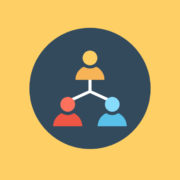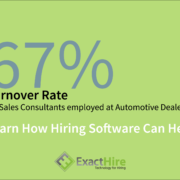HR Software is Essential for Modern Organizations
Need software for hiring and onboarding? Or, maybe you’re looking to outsource some of your hiring tasks to a SHRM certified team?
Let’s have a quick chat to learn whether ExactHire has a solution that fits your needs!
Our team of SHRM certified strategists recently traveled to the 2023 Indiana HR Conference. They came back with a plethora of useful and important information. Over the coming weeks ExactHire will be detailing what we believe to be the most important takeaways from this conference.
HR software companies have become indispensable partners for businesses of all sizes. They help you manage your most valuable asset – your employees – with greater ease and effectiveness.
In today’s fast-paced and dynamic business landscape, organizations are constantly seeking ways to streamline their operations, improve efficiency, and stay competitive. One area where companies are increasingly turning to technology for assistance is human resources.
The Role of HR Software in Modern Organizations
Human resources is the backbone of any organization. HR professionals are responsible for recruiting, onboarding, training, managing benefits, handling payroll, and ensuring compliance with labor laws. They also play a crucial role in employee engagement, performance management, and fostering a positive workplace culture.
In the past, HR tasks were largely manual and time-consuming, requiring a significant amount of paperwork and administrative effort. However, with the advent of HR software, these processes have become more streamlined and efficient. Allowing HR professionals to focus on strategic initiatives that drive business growth.
Why HR Software is Essential
- Efficiency and Time Savings: HR software automates many routine administrative tasks, such as employee record-keeping, payroll processing, and benefits management. This automation saves HR teams countless hours, allowing them to allocate their time and resources more effectively. With HR software, businesses can process HR functions faster and with greater accuracy.
- Data Accuracy and Compliance: Compliance with labor laws and regulations is a critical aspect of HR management. HR software companies design their platforms to ensure data accuracy and compliance with local, state, and federal laws. This minimizes the risk of costly errors, fines, or legal issues that can arise from non-compliance.
- Employee Self-Service: Many HR software solutions offer self-service portals for employees, allowing them to access their own information, submit time-off requests, update personal details, and view pay stubs. This not only empowers employees to take control of their HR needs but also reduces the administrative burden on HR staff.
- Streamlined Recruitment and Onboarding: Finding and hiring the right talent is a top priority for businesses. HR software simplifies the recruitment process by providing tools for posting job openings, reviewing resumes, conducting interviews, and making job offers. Onboarding new hires is also more efficient with digital workflows and training modules.
- Performance Management and Talent Development: HR software often includes performance management tools that help track employee goals, provide feedback, and facilitate performance reviews. It also supports talent development by identifying skills gaps and creating training plans to upskill employees.
Scaling your Business
In addition to increasing efficiency in process that companies already have to do they can also aid in scaling the company. Tasks that were once pen and paper could be done for 10’s om employees or less. However when a company scales to 50, 100, or even more employees it can become a problem. HR software handles this process and allows you to scale in various ways.
- Analytics and Reporting: HR software companies offer robust analytics and reporting features that enable organizations to make data-driven decisions. HR professionals can gain insights into workforce trends, turnover rates, compensation structures, and more, helping them optimize their HR strategies.
- Scalability: As businesses grow, their HR needs evolve. HR software is scalable, meaning it can adapt to accommodate changing requirements. Whether a company is a small startup or a multinational corporation, HR software can scale up or down to meet the organization’s size and complexity.
- Cost Savings: While there is an initial investment in HR software, the long-term cost savings are substantial. Fewer manual processes mean fewer personnel hours devoted to administrative tasks, reduced paperwork and printing costs, and lower error rates. Additionally, improved workforce management can lead to better resource allocation and reduced turnover. Saving money on recruitment and training.
- Remote Work Support: In the wake of the COVID-19 pandemic, many organizations shifted to remote work. HR software companies quickly adapted by offering remote-friendly features, such as virtual onboarding, digital document signing, and secure access to HR data from anywhere. This flexibility has become crucial in the modern work environment.
- Employee Engagement and Satisfaction: HR software can contribute to improved employee engagement and satisfaction. When employees have easy access to their HR information, receive timely feedback, and experience a smooth onboarding process, they are more likely to feel valued and engaged in their work.
Conclusion
In the digital age, HR software companies have emerged as vital partners for organizations. Especially those looking to optimize their HR processes, enhance employee experiences, and drive business success. The benefits of HR software extend beyond simple efficiency gains; they include improved data accuracy, compliance, and strategic workforce planning.
As technology continues to advance and the business landscape evolves, HR software companies will remain at the forefront of innovation. They will continue to help organizations adapt to new challenges and opportunities. For companies that value their employees as their most valuable asset, investing in HR software is not just a choice but a necessity for staying competitive and thriving in the modern world of work.









